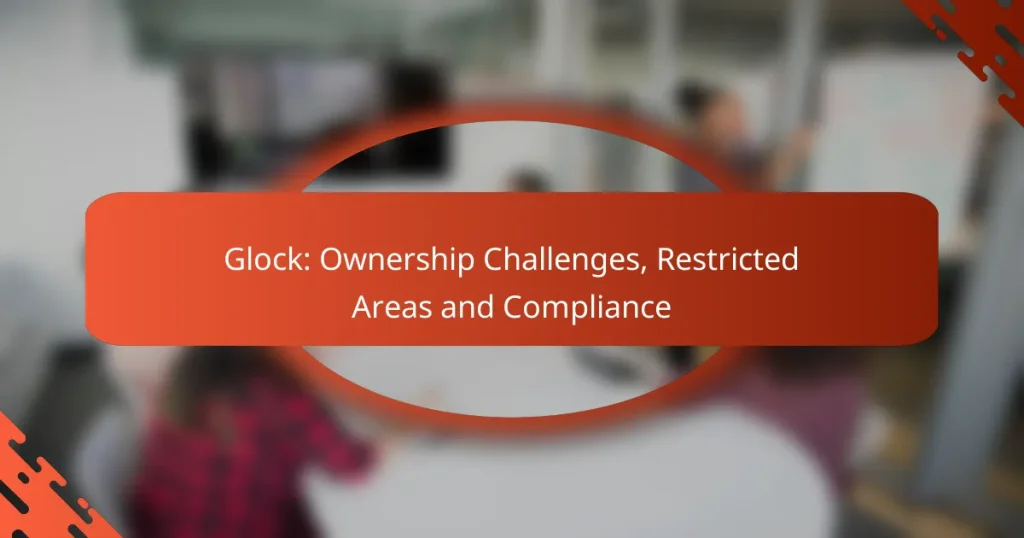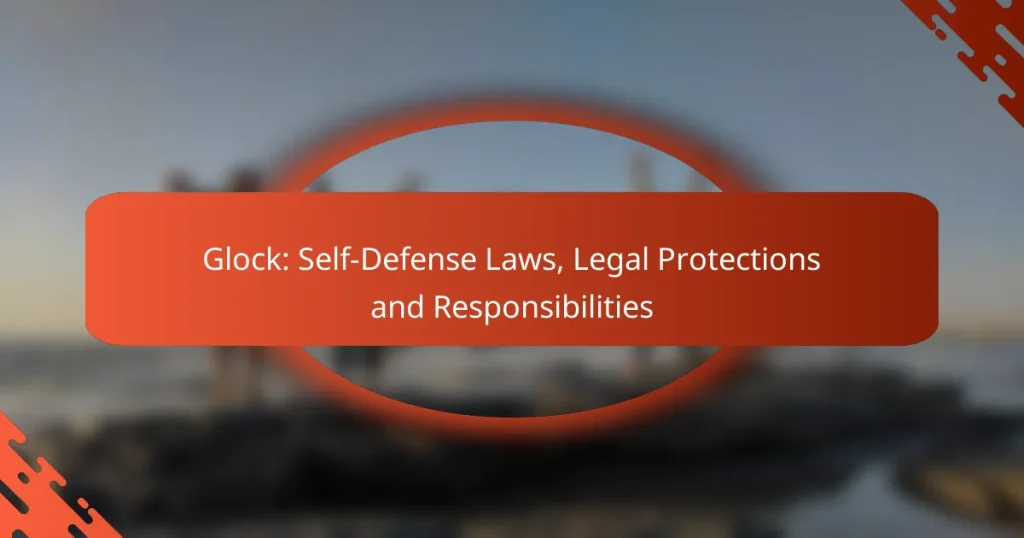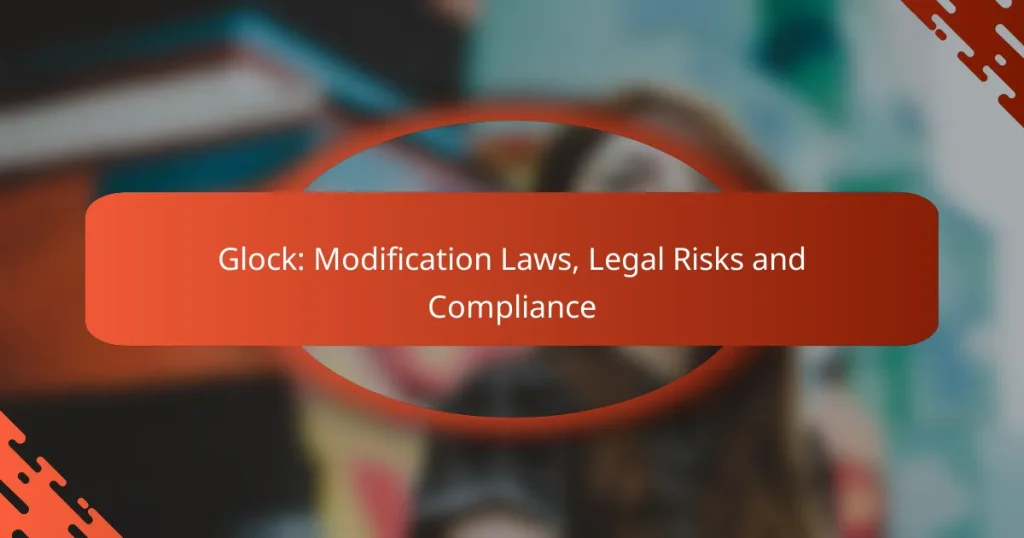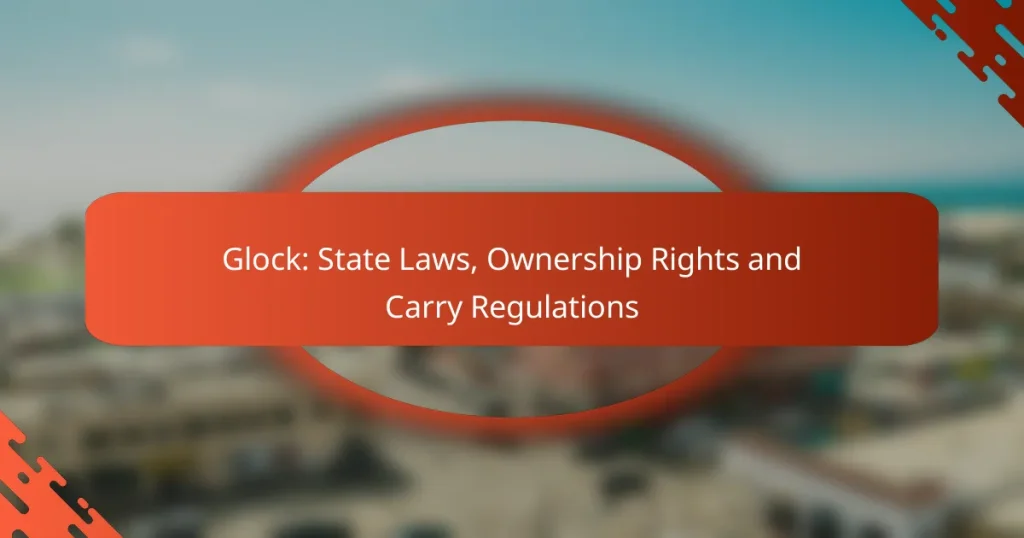Owning a Glock handgun in the USA requires adherence to various federal and state laws, including age restrictions and background checks. Familiarity with these legal aspects is essential for responsible ownership, as violations can result in serious legal consequences. Glock also complies with strict manufacturing standards and safety regulations to promote responsible firearm use.
Glock: Ownership Challenges, Restricted Areas and Compliance
Glock: Self-Defense Laws, Legal Protections and Responsibilities
Glock: Liability Insurance, Coverage Options and Legal Protection
Glock: Modification Laws, Legal Risks and Compliance
Glock: State Laws, Ownership Rights and Carry Regulations
Glock: Legal Resources, Ownership Guides and Support
What are the legal requirements for owning a Glock handgun in the USA?
To own a Glock handgun in the USA, individuals must comply with federal and state laws, including age restrictions, background checks, and potential licensing requirements. Understanding these legal aspects is crucial for responsible ownership.
Federal firearm regulations
Federal regulations govern the sale and ownership of firearms, including handguns like Glock. The Gun Control Act of 1968 establishes criteria for who can purchase firearms, including prohibitions for felons, individuals with restraining orders, and those deemed mentally unfit.
Additionally, all firearm sales by licensed dealers must be conducted through a background check, ensuring that buyers meet federal eligibility requirements. It is essential to be aware of the National Instant Criminal Background Check System (NICS) used for these checks.
State-specific laws
Each state has its own laws regarding handgun ownership, which can vary significantly. Some states may have additional restrictions, such as waiting periods, mandatory training courses, or specific registration requirements for handguns.
It is important to research your state’s laws to ensure compliance, as violations can lead to severe penalties. Websites of state law enforcement agencies often provide up-to-date information on local firearm regulations.
Background check requirements
In the USA, background checks are mandatory for all firearm purchases from licensed dealers. These checks are designed to verify the buyer’s eligibility based on federal and state laws.
Private sales may not always require background checks, depending on state laws. However, it is advisable to conduct a background check even in private transactions to ensure responsible ownership and compliance with legal standards.
Age restrictions
Federal law mandates that individuals must be at least 21 years old to purchase a handgun from a licensed dealer. However, some states allow individuals as young as 18 to possess handguns under certain conditions, such as parental consent or military service.
Always verify the age requirements in your state, as they can differ and may impose additional restrictions on younger individuals.
Permit and licensing needs
Some states require a permit or license to carry a handgun, which may involve a background check and training course. The process for obtaining a permit can vary widely, with some states offering “shall-issue” permits and others adopting “may-issue” policies.
Before purchasing a Glock handgun, check if your state requires a permit for ownership or concealed carry, and ensure you complete all necessary steps to obtain it legally.
How does Glock comply with firearm regulations?
Glock adheres to firearm regulations by following strict manufacturing standards, implementing safety features, and maintaining thorough record-keeping practices. These measures ensure that their handguns meet legal requirements and promote responsible ownership.
Manufacturing standards
Glock firearms are produced in compliance with various international and national manufacturing standards, including ISO 9001 certification. This certification ensures that Glock maintains high-quality production processes, which contribute to the reliability and safety of their handguns.
Additionally, Glock handguns undergo rigorous testing to meet safety and performance benchmarks set by regulatory bodies. This includes assessments for durability, accuracy, and functionality under various conditions.
Safety features
Glock incorporates several safety features in their handguns, such as the Safe Action system, which includes three independent safety mechanisms. These features help prevent accidental discharges, making Glock firearms safer for users.
Moreover, many Glock models come equipped with trigger safeties, drop safeties, and firing pin safeties, ensuring that the gun only fires when intended. These features are crucial for responsible firearm handling and ownership.
Record-keeping practices
Glock maintains comprehensive records of all firearms manufactured, which is essential for compliance with legal regulations. This includes tracking serial numbers and production details to facilitate accountability and traceability.
In many jurisdictions, Glock also collaborates with law enforcement agencies to ensure that records are accessible for background checks and investigations. This practice supports responsible gun ownership and helps prevent firearms from falling into the wrong hands.
What are the consequences of illegal Glock ownership?
Illegal ownership of a Glock handgun can lead to severe legal repercussions, including criminal charges and civil liabilities. Understanding these consequences is crucial for responsible firearm ownership.
Criminal penalties
Possessing a Glock without the necessary permits or in violation of local laws can result in significant criminal penalties. Offenses may range from misdemeanors to felonies, depending on the jurisdiction and the specifics of the violation.
For example, in many states, illegal possession could lead to fines ranging from hundreds to thousands of dollars, along with potential imprisonment. Repeat offenders often face harsher sentences, including longer jail time.
Civil liabilities
In addition to criminal penalties, illegal Glock ownership can expose individuals to civil liabilities. If a firearm is used in a crime or causes harm, the owner may be held financially responsible for damages.
This could include compensation for medical expenses, property damage, and even punitive damages in some cases. Insurance policies may also deny coverage for incidents involving illegal firearms, leaving the owner financially vulnerable.
Impact on future firearm purchases
Having a record of illegal Glock ownership can severely impact future firearm purchases. Many states require background checks, and a criminal record can disqualify individuals from obtaining permits or purchasing firearms legally.
Additionally, a history of illegal ownership may lead to increased scrutiny from law enforcement and potential difficulties in obtaining necessary permits in the future. Responsible ownership and adherence to laws are essential for maintaining the right to own firearms.
What are the differences in Glock laws across states?
Glock laws vary significantly from state to state, affecting ownership, carrying, and usage. Understanding these differences is crucial for legal compliance and responsible firearm ownership.
Concealed carry laws
Concealed carry laws dictate how individuals can carry a Glock handgun hidden from view. Some states require a permit, while others have adopted constitutional carry, allowing individuals to carry without a permit. It’s essential to check the specific requirements in your state, as some may mandate training courses or background checks.
For example, states like Texas and Florida require permits, whereas states like Vermont allow concealed carry without any permit. Always verify local regulations before carrying concealed.
Open carry regulations
Open carry regulations govern the visibility of firearms in public. In some states, open carry is fully legal without a permit, while others may have restrictions or require a license. States like Arizona allow open carry without a permit, while states like California have stricter regulations that may limit open carry in certain areas.
Understanding local laws is vital, as open carry can attract attention and may lead to legal complications if not properly regulated. Always familiarize yourself with local ordinances regarding open carry.
Reciprocity agreements
Reciprocity agreements between states determine whether a concealed carry permit from one state is recognized in another. Some states honor permits from various states, while others have limited recognition. For instance, states like Utah have broad reciprocity, while others may only recognize permits from neighboring states.
Before traveling, check which states recognize your permit to avoid legal issues. Websites that track reciprocity agreements can be helpful resources for this information.
How do Glock handguns compare to other brands legally?
Glock handguns generally adhere to similar legal standards as other firearm brands, but specific regulations can vary by state or country. Key factors include licensing, registration, and restrictions on certain models or features.
Licensing and Registration Requirements
In many jurisdictions, owning a Glock handgun requires a valid firearm license and registration. This process often involves background checks and may include safety training courses. States like California have more stringent regulations compared to others, such as Texas, where requirements are more lenient.
Restrictions on Features
Some states impose restrictions on specific features of handguns, including magazine capacity and safety mechanisms. For example, states like New York have limits on magazine sizes, which can affect the legality of certain Glock models. Understanding these restrictions is crucial when purchasing a Glock.
Concealed Carry Laws
Glock handguns are popular choices for concealed carry, but laws governing this practice differ widely. Some states require a permit for concealed carry, while others allow open carry without a permit. It is essential to familiarize yourself with local laws to ensure compliance when carrying a Glock.






